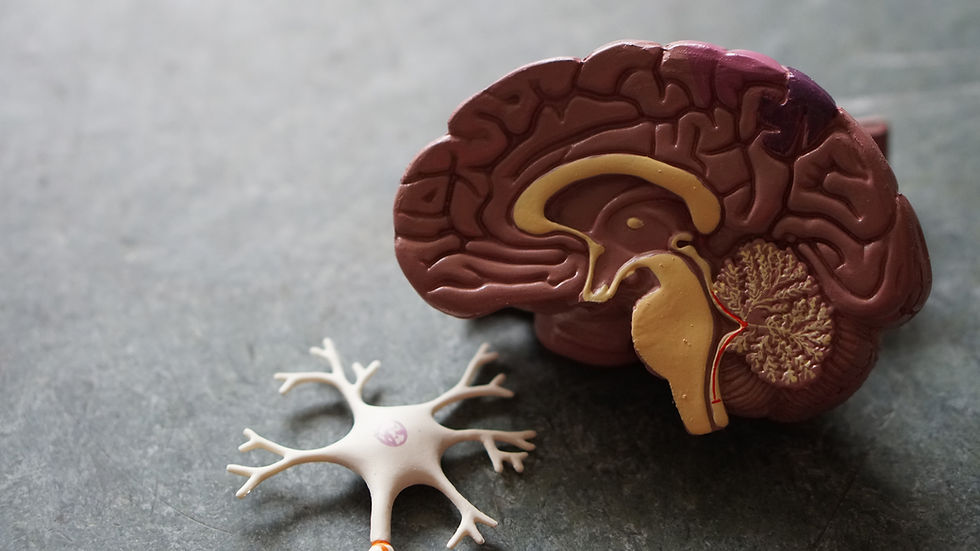Acupuncture For Alzheimer’s Disease
- www.Acute-Acupuncture.com

- Sep 20, 2023
- 3 min read
Updated: Apr 19, 2024

Alzheimer’s Disease is a neurodegenerative disorder that is associated with memory loss, cognitive impairment, and behavioral changes, and it is a significant health concern worldwide. Traditional Chinese Medicine has been used for centuries to treat various neurological and psychiatric disorders like anxiety and depression. Acupuncture, a highly valued modality of Traditional Chinese Medicine, is effective in the treatment of Alzheimer’s disease. Several studies have explored the use of acupuncture as an alternative approach to addressing the symptoms of Alzheimer’s disease, including cognitive decline and pathological changes, exhibiting promising results.
Alzheimer’s Disease results from the accumulation of beta-amyloid deposits and cognitive decline. This affects the brain’s function and behavior in patients with Alzheimer’s disease. Acupuncture aims to restore and balance, promoting self-regulation and overall health. The insertion of fine needles into specific points on and around the body stimulates physiological responses, including the release of endorphins, neurotransmitters, and other signaling molecules that regulate nerve impulses and the immune system. Acupuncture may help slow the progression of Alzheimer’s disease by improving cognitive function, reducing inflammation, regulating metabolism, and controlling neurotransmitter imbalances.
A study by Yang et al. (2019) evaluated the effect of electroacupuncture on cognitive function in Alzheimer’s disease patients. Electroacupuncture improved cognitive function in patients with mild to moderate Alzheimer’s disease, as indicated by the Mini-Mental State Examination scores. The study also found that electroacupuncture significantly reduced beta-amyloid and tau protein levels in the cerebrospinal fluid, which are biomarkers of Alzheimer’s disease.
In another study, Zhu et al. (2019) explored the effects of acupuncture on cerebral blood flow in Alzheimer’s patients. They found that acupuncture promoted cerebral blood flow in critical regions of the brain, which suggests that acupuncture can enhance the nutrient and oxygen supply in the brain. Additionally, acupuncture led to improved cognitive function in patients with Alzheimer’s disease, which is essential for the treatment of the disease.
Acupuncture may also have a protective effect on brain cells, reducing inflammation and oxidative stress. A study conducted by Gao et al. (2019) reported that acupuncture treatment of Alzheimer’s disease patients promoted the regeneration of brain cells, reducing the accumulation of beta-amyloid and improving cognitive function. The beneficial effects of acupuncture on Alzheimer’s disease patients are likely due to its ability to promote the release of brain-derived neurotrophic factor, which is involved in the survival, growth, and maintenance of brain cells.
Acupuncture for Alzheimer’s Disease presents a promising alternative approach to treating the abnormalities of Alzheimer’s disease. Acupuncture has been identified as a beneficial therapy that may improve cognitive function, reduce inflammation, regulate metabolism, and control neurotransmitter imbalances. Acupuncture in the treatment of Alzheimer’s disease: the findings of research thus far suggest that acupuncture can be considered as a complementary therapy that may help manage the symptoms of Alzheimer’s disease and ultimately improve the quality of life of affected individuals. Collaborating with Acute Acupuncture and other healthcare providers and integrating acupuncture into a comprehensive treatment plan may offer additional benefits to patients and enhance their overall well-being. After treatments, one may feel relaxed, energized, and rejuvenated. Communicating with your practitioner about your experience is essential to ensure you receive the maximum benefits from these treatments. Click the button below and book a complementary 15-minute consultation at Acute Acupuncture, 163 The Terrace, Wellington Central, Wellington. Let's discuss if acupuncture is the right thing for you. Thank you for taking the time to read this Blog Post. Don't forget to like, subscribe, and share this post with others. If you have any questions or concerns, check out Acute-Acupuncture Wellington Frequently Asked Questions (FAQs), as we find this helps answer most people's questions. Please leave a comment below.






Comments